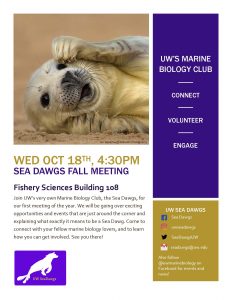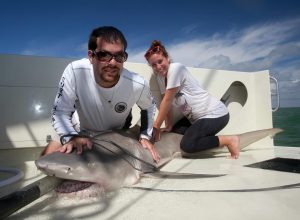Sea Dawgs Marine Biology Club Mtg 10/18 at 4:30

All current UW students are invited to join the Sea Dawgs Marine Biology club for their first meeting on Wednesday, October 18 at 4:30 in FSH 108. Connect, volunteer, and engage with the community of students passionate about marine biology.
Read moreMarine Bio Student Profile: Abby von Hagel

Abby von Hagel is a student from Seattle in the Interdisciplinary Honors Program pursuing a Major in Molecular, Cellular and Developmental Biology and a Minor in Marine Biology with plans to graduate in 2019. We talked with Abby to find out what inspires her to study marine biology and to learn how an introductory course led to her researching at the UW’s marine field station at Friday Harbor Labs.
Read more[speaker]: The impact of density-dependent changes in individual life histories on marine population dynamics

In this presentation I review how current fisheries models account for ecological processes. Subsequently, I will introduce a class of size-structured population models based on individual energetics that explicitly account for ecological interactions of individual fish. Analysis of models of this kind will be shown to not only increase our understanding of the mechanisms shaping fish community dynamics, but also make counterintuitive predictions about the outcome of fisheries management strategies
Read moreMary Gates Scholarships ($5,000) – info sessions every Friday

The Mary Gates Endowment for Students is currently accepting scholarship applications. Mary Gates Scholarships provide $5,000 ($2,500 per quarter for two quarters) for students to pursue leadership or research projects. These scholarships benefit students in the current academic year, and are open to all UW undergraduate students regardless of class year, major, residency status, or UW campus. Deadlines are coming up soon, so attend an information session!
Read moreGoldwater Scholarship for sophomores & juniors in STEM

The UW application for students interested in seeking nomination for the Goldwater Scholarship is now available! Brief details are included here, and further information and application instructions are at https://expd.uw.edu/expo/scholarships/goldwater. Please find a flyer attached as well. Please share with undergraduate sophomores and juniors (based on graduation date) in STEM fields engaged in research and planning for research careers!
GOLDWATER SCHOLARSHIP DETAILS:
The BARRY GOLDWATER SCHOLARSHIP is designed to attract outstanding students into research careers in mathematics, the natural sciences, and engineering.
[speaker]: Recreational shark fishing in Florida: An interdisciplinary analysis of an emerging conservation issue

Recreational shark fishing in Florida: An interdisciplinary analysis of an emerging conservation issue
David Shiffman
Liber Ero Postdoctoral Research Fellow
Simon Fraser University
Thursday, September 28, 2017 4:00 pm
Fishery Sciences Building, Room 102
Open advising about undergraduate programs hosted in FSH lobby from 3:30-4:00 pm
Sharks are one of the most threatened groups of marine fishes, but the majority of research, advocacy, and management attention to date has focused on threats stemming from commercial fisheries.
[UW Today]: Researchers, students on annual expedition to maintain internet-connected deep-sea observatory

While at sea a deep-sea robot will brave the crushing pressures and cold temperatures, while the team works day and night to direct the dives and prepare equipment above water. The researchers will be cleaning some instruments from marine life, and swapping out sensors that collect hot spring fluids and DNA samples over their year-long missions. The team is posting regular updates from the ship. On Aug. 1, members reported seeing pyrosomes, the bioluminescent tube-shaped tropical animals that have been seen this year off the Pacific Northwest. They are also posting highlights of the robot-captured dive videos, including one showing how marine creatures are getting cozy on the UW-built technology.
Read more[The Whole U]: Faculty Friday: Luke Tornabene

Learn more about one of the School of Aquatic & Fishery Sciences’ newest faculty Associate Professor Luke Tornabene and his work as the curator of the UW Fish Collection in this ‘Faculty Friday’ profile.
Read more[Tide Bites] Understanding the Effects of Ocean Acidification on Predator-Prey Interactions

Marine organisms are experiencing dramatic environmental changes due to global climate change. As atmospheric carbon dioxide concentrations rise, the oceans absorb increasing amounts of carbon dioxide, which results in acidification. While ocean acidification affects several different types of organisms, calcifiers — those that make their shells or skeletons from calcium carbonate like shellfish or corals — have been identified as particularly vulnerable.
Read more[UW Today]: UW oceanography senior finds plastic microfibers are common on Puget Sound beaches

As the infamous floating “garbage patch” churns up bits of plastic in the tropical Pacific Ocean, a University of Washington undergraduate has discovered a related problem much closer to home: nearly invisible bits of plastic on Puget Sound beaches.
Read more